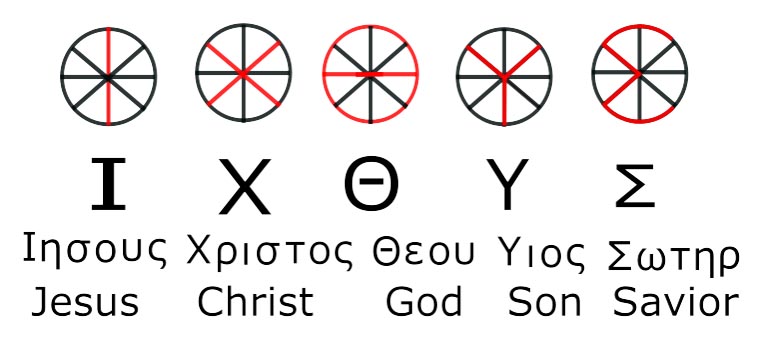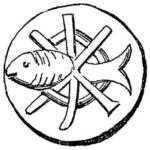04/15/22
⊙ in ♓︎
I am writing this on the evening of Good Friday following some recent meditations on Charity, and having read some literature relevant for today’s date. This coming Sunday, my wife and I will be gathering for Easter over a ham dinner with relatives, including some members of my family which I had fallen out of contact with for nearly a decade now. Good Friday, Pig, and Communion of sorts are the themes of today’s post with a little light shed onto Charity.
Eliphas Levi in the Science of Spirits explained eloquently the symbolism of Communion. He had said that in Christ’s revealing the law of unity which is the law of love, armed with the power to overcome the selfishness of the flesh, which is division and death, had instituted a sign called Communion. He said of communion, that it was nothing other than charity represented by a common table, and as Christ had given up his flesh to pain and death in order to bequeath his faithful the fraternal bread to which he attached his preserving thought, he said to them: “Eat all of you, this is my flesh!” as he said of the wine of fraternity: “Drink, all of you, this is my blood, for I will pour it out in its entirety to assure you of the reality of this sign forever.” I wrote in my post ‘Meditating on Agape and Thelema’ of the Eucharist, the communion known as an “Agape Feast” which is a topic I will be touching upon soon, given that I had since read something interesting and relevant from the Zen tradition. I wish to do a follow-up post on the matter in the near future but must put a pin in that for now, so check back in the coming week for that discussion.
Back to Levi’s Science of Spirits, which includes a tale which I wish to paraphrase and present here today. It is a parable about charity, and it is illustrated by the ascetic Saint Spyridon (who had lived approximately c. 270-348.) It is said that it was a Good Friday following the Lent period (abstaining from meat for 40 days), and Spyridon’s food of the holy quarantine were exhausted, and as he was to spend this day and the next without consuming any food at all, he had nothing at home but a piece of pig’s flesh hanging from the smoke of the fireplace which he had reserved for an Easter feast. An unexpected knock happened upon his door, and he opened it to find a traveller exhausted with fatigue. The bishop received him with alacrity and surrounded him with paternal care; but he soon discovered that his guest was about to faint from starvation. It was too late to go elsewhere and the city was quite far away. Without hesitation, Spyridon cut a piece of salted meat, cooked it and presented it to the traveller who rejected it with astonishment and fear: “I am a Christian, Father” he said, “so how can you offer me flesh to eat today! Do you think I am capable of insulting the death of Christ, our master by my intemperance?”
“I am a Christian like you, my son,” Spyridon replied gently, “and what is more, I am a bishop, that is to say, a pastor and a doctor. It is as a doctor that I offer you this food, the only food I can offer you. You are exhausted, and tomorrow it may be too late to save your life, so eat this food which I bless, and live.” — “Never,” replied the traveller, “for you advise me what you would not do yourself.” — “What I would not do for myself perhaps,” said the old man, “but what I would certainly do for you, as you are going to do for me, who is begging you. Here, would you like me to put some of this meat in my mouth to encourage you to use it without scruples?” And so St. Spyridon took and ate some of the pork, to urge his guest to do the same; for charity, according to him, was a more imperative law than that of abstinence or fasting.
The traveller to deny sustenance, life, and charity would be a foolish person worthy of having a wheel broken over their head. For nothing is wiser, more harmonious, more moderate, more amiable than the spirit of charity. Charitas patiens est, benigna est. Charitas non aemulatur, non agit perperam, non inflatur; non est ambitiosa, non quaerit quae sua sunt, non irritatur, non cogitat malum; non gaudet super iniquitate, congaudet autem veritati.
Some fun: A foolish person was sometimes figuratively called a fish (ἰχθύς). This is fitting for today’s meditation as the sun is in Pisces (the fish). Moreso, ἰχθύς – ikhthús, is an alternate form of ΙΧΘΥΣ which is an acronym representing Ἰησοῦς Χριστός Θεοῦ Υἱός Σωτήρ. This acronym allows the letters to be traced within an eight spoked wheel (a symbol common to Sun worship – the Buddihst eightfold path, and a symbol of Christianity). The ichthys (fish) being a symbol of Jesus, known commonly as the Jesus fish.


Anyways… Aleister Crowley translated Eliphas Levi’s Key of the Mysteries in which we find the following: “Before charity, faith prostrates itself, and conquered science bows. There is here evidently something greater than humanity; charity proves by its works that it is not a dream.” – “Charity! word divine, sole word which makes God understood, word which contains a universal revelation!” It was on Good Friday that Jesus willingly suffered and died by crucifixion on the cross. The Key of the Mysteries also states: “It is by charity, finally, that the folly of the cross has become the wisdom of the nations, because every noble heart has understood that it is greater to believe with those who love and who devote themselves, than to doubt with the egoists and with the slaves of pleasure.”
I’ll wind down the post with that quote. It is an appropriate note to end on, and it will prepare us for our future discussion, as the next post will return our gaze upon the concept of Agape and will highlight how this is fitting for enlightenment within the Zen tradition, and how it parallels to Aleister Crowley’s Thelema.
Pisces is the last of the Signs, so represents the last stage of winter, or of night, and according to Crowley it may very well be called the Gateway of Resurrection. So as the sun sets as I write these words, I see no better way than to end this post than to say: Have a Good night.

